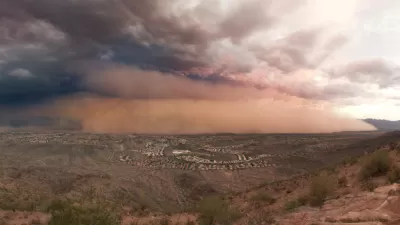Yesterday, the controversial plan to expand New York University's footprint in Greenwich Village over the next 20 years was approved by a City Council committee after last minute negotiations and reductions, reports Joseph Berger.
NYU's controversial 2031 expansion plan came up before the City Council's Land Use Committee on Tuesday, and came away with a 19 to 1 victory, "all but assuring that the city will give the university the go-ahead to proceed with its much-debated development," declares Berger. Under pressure from Margaret Chin, who represents Greenwich Village, NYU agreed to further reductions in building sizes, and promised to preserve more parkland and create more communal spaces, after late night and early morning negotiations. "The changes amount to a 26 percent reduction in space from N.Y.U.'s original plan," notes Berger.
In The New York Observer, Matt Chaban reports on the vocal, if late in the game, opposition to the plan by one key stakeholder group - NYU faculty. According to Chaban, "36 departments or divisions at the university have come out
against the plan," led by Mark Crispin
Miller, a media and culture professor. The group released an alternative plan on the same day as the council vote, arguing, "that NYU only needs a fraction of the space it is
proposing because little of what is being initially built-only 18
percent in the first of four towers-is for academic uses."
While the faculty plan came late in the five-year planning process, the Greenwich Village Society for Historic Preservation, led by executive director Andrew Berman, have raised consistent objections to the plan for the duration of the process.
"In a statement, Mr. Berman called the Land Use Committee's approval 'a
slap in the face to the thousands of area residents and the countless
N.Y.U. faculty and staff workers who called for the plan to be voted
down.'"
"We will take this battle to the full Council," he added, "and possibly beyond."
FULL STORY: N.Y.U. Expansion Plan Wins Key Vote of Council Panel

Planetizen Federal Action Tracker
A weekly monitor of how Trump’s orders and actions are impacting planners and planning in America.

Restaurant Patios Were a Pandemic Win — Why Were They so Hard to Keep?
Social distancing requirements and changes in travel patterns prompted cities to pilot new uses for street and sidewalk space. Then it got complicated.

Map: Where Senate Republicans Want to Sell Your Public Lands
For public land advocates, the Senate Republicans’ proposal to sell millions of acres of public land in the West is “the biggest fight of their careers.”

Maui's Vacation Rental Debate Turns Ugly
Verbal attacks, misinformation campaigns and fistfights plague a high-stakes debate to convert thousands of vacation rentals into long-term housing.

San Francisco Suspends Traffic Calming Amidst Record Deaths
Citing “a challenging fiscal landscape,” the city will cease the program on the heels of 42 traffic deaths, including 24 pedestrians.

California Homeless Arrests, Citations Spike After Ruling
An investigation reveals that anti-homeless actions increased up to 500% after Grants Pass v. Johnson — even in cities claiming no policy change.
Urban Design for Planners 1: Software Tools
This six-course series explores essential urban design concepts using open source software and equips planners with the tools they need to participate fully in the urban design process.
Planning for Universal Design
Learn the tools for implementing Universal Design in planning regulations.
Heyer Gruel & Associates PA
JM Goldson LLC
Custer County Colorado
City of Camden Redevelopment Agency
City of Astoria
Transportation Research & Education Center (TREC) at Portland State University
Camden Redevelopment Agency
City of Claremont
Municipality of Princeton (NJ)




























